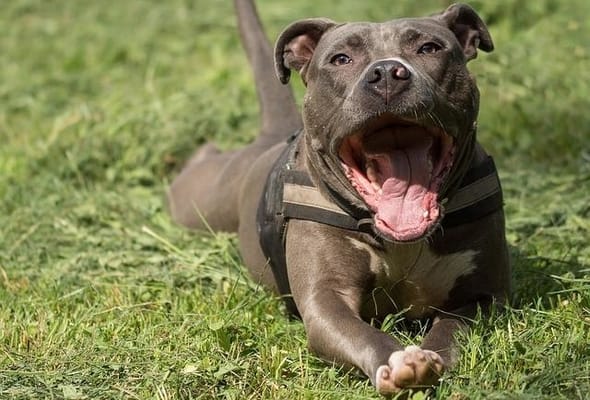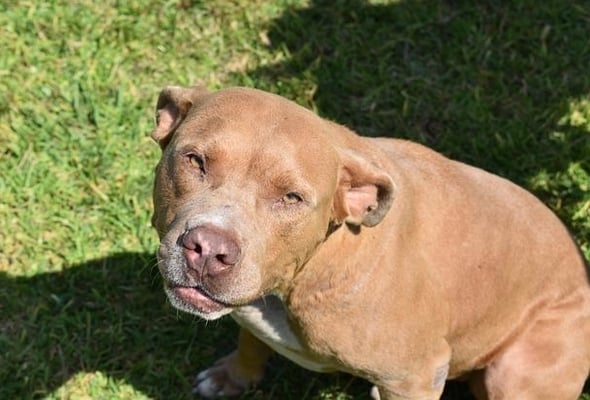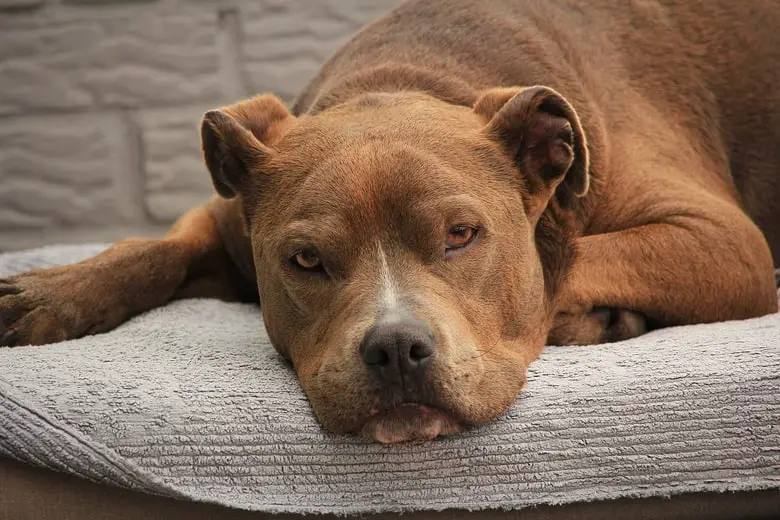Pitbulls are seen as an aggressive and stubborn breed. They have a history of being a fighting dog, and people today still use them in illegal dog fights. This creates a stigma around them and worsens their reputation. Because of myths around their stigma, many people ask, do pitbulls have locking jaws?
Many people think that pitbulls have a jaw that locks when they bite down. Let it be said that not every Pitbull is aggressive and they will not bite unless trained to or if something is seriously bothering them. So with that, let’s get into answering the question.
Do Pitbulls Have Locking Jaws?
It’s a common misconception that when a Pitbull bites down they have the ability to lock their jaw in place so the prey cannot escape. This is untrue. No dog has that ability, and Pitbulls aren’t anatomically different from other breeds.
Pitbulls are the breed with the highest rate of abuse, abandonment, and are still bred for illegal dog fighting in some states. They really do have the worst reputation, when in reality they are truly no different than most other dogs.
The temperament of a dog comes down to how you treat it. When a dog is constantly abused, it’s no wonder it tends to be more violent and quick to snap.
Pitbulls are loving animals, and when socialized and trained properly, can become your bestest friend in the world. They are not aggressive by nature and will not bite at you or attack you for no reason.
If your Pitbull suddenly seems to be acting more aggressive, a vet appointment could help. They could be hiding an illness and trying to protect themselves with aggression.
What is Lockjaw in Dogs?
The myth is that when a Pitbull bites, some mechanism engages that locks their jaw in place so they cannot let go. As we said previously, this is not true. Many studies have been done on Pitbull jaws and they have shown that they are structured exactly the same as other breeds of their size.

There is not any extra special mechanism found that would make this possible. What lockjaw really is in dogs is the inability to properly open and close their jaws in a full, healthy way. This can be brought on by a variety of causes, mainly tetanus, arthritis, and sometimes illnesses.
Other symptoms aside from that can include a constant open mouth, drooling, swelling, and noticeable pain in your dog. Tetanus is the most common of these ailments, and happens when a dog has a puncture wound.
The tetanus bacteria will infect the wound and enter the dog’s nervous system, causing lockjaw. There is also TMJ, which is when the jaw bone is misshaped whether from injury or birth. The treatment for lockjaw depends on the cause. If it’s TMJ, it can be treated with surgery and restructuring the jaw bone.
If the cause is tetanus you will be looking at a hospital stay, antibiotics, wound care, and recovery. If you’re looking for a home remedy, the only thing vets will recommend is some physical therapy exercises to ease the pain.
Do Pitbulls Have Stronger Jaws Than Other Dogs?
While Pitbulls do not have locking jaws, they still do have stronger jaws than some other dogs. Getting bit by a chihuahua would hurt significantly less than getting bit by a Pitbull. However, Pitbulls do not have the strongest bite out of every dog breed.

As far as bite strength goes, they typically rank pretty average. The average bite of a Pitbull is around 235 psi, which is actually lower than a lot of other dog breeds of the same size and build. However it still is considerably high and is considered a strong bite.
When a pitbull does bite down on something, it will definitely hurt and cause some damage. There are some cases of Pitbulls biting down and not letting go. This is mainly where the myth of them having a locking jaw comes from.
While they may hold on very tight with their bite, this is because they tend to be a more stubborn breed and don’t want to let their prey go. This is why proper training should be taught early. If they happen to bite down you can train them to let go fairly easily.
Which Dogs Have the Strongest Jaws?
While Pitbulls are higher on the list than other dogs, there are quite a few that top them out. Remember, this is based solely on jaw strength and bite force, not on any mechanism that is present, as that is not anatomically possible in any dog breed. The dog with the strongest bite is the Kangal, who has a bite force of 734 psi!
That is much higher than most other dogs on this list. They were bred to hunt down larger animals like sheep and livestock. Second to them are Bandogs, who have a bite force of 730 psi. Both of these dogs would make loving family dogs, as well as great guardians.
Following these two we have the English Mastiff with a bite force of 556 psi. Their jaws are less used for hunting and more used for gnawing on a good toy. After them come Rottweilers who have the jaw strength of 328 psi.
Rottweilers are extremely protective dogs, but also good with children. The last two that come before the Pitbull at 235 psi are American Bulldogs and German Shepherds. American Bulldogs have a bite force of 305 psi and German Shepherds sit at 238 psi.
All of the dogs we’ve listed here make wonderful, protective companions that could make a great addition to your home.
Which Dogs Have the Weakest Jaws?
While dogs with strong jaws are studied a bit more than dogs with weaker jaws, there still is some information out there on dogs with a weaker bite. These dog breeds often include pugs, golden retrievers, poodles, and schnauzers.
They mainly hang around the 190 psi range for their bite force. This is relatively low compared to the bigger dogs like the Kangal. A good rule of thumb is that typically the smaller a dog is, the weaker their bite force is as well.
Chihuahuas, for example, have an estimated bite force of 100-130psi. They are very small, so this seems to make sense, but their bite still hurts nonetheless. Pugs, Jack Russell Terriers, and Fox Terriers can also be accounted for having weaker jaws.
There is also a possibility that any dog could end up having a weak jaw, based on different factors such as birth defect, injury, and old age. Dogs can sometimes develop an underbite that can weaken their jaw and make it difficult for them to bite or chew.
Conclusion
It’s a common misconception that Pitbulls have locking jaws based on a secret mechanism in their jaw. This is untrue, as Pitbull jaws are structured just the same as other dog breeds of similar size. The myth comes from their stubbornness, as sometimes they may not want to let go of what they bite down on.
In fact, Pitbulls don’t even have the strongest bite of all dogs, but are one of the only dogs that have this myth hanging around their reputation. There are quite a few dogs with stronger jaws than a Pitbull, and they are seen as good family dogs.
Pitbulls fit right in with them, and can make a great addition to any household.

